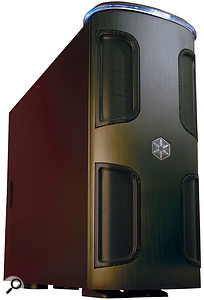 Super‑powerful PCs such as this Scan Power DAW PC that can run many, many plug‑ins and virtual instruments are highly desirable, of course, but don't let the technology get in the way of what you really want to do: make great music.
Super‑powerful PCs such as this Scan Power DAW PC that can run many, many plug‑ins and virtual instruments are highly desirable, of course, but don't let the technology get in the way of what you really want to do: make great music.
Science‑fiction writer Arthur C. Clarke formulated his third 'law' of prediction in 1961, that "any sufficiently advanced technology is indistinguishable from magic.”. When I first started working with computers in the early 1970s, you had to type in a set of instructions that were transferred to a handful of punched cards, and then inserted into the card reader in sequence, before the computer programme was finally run. If I'd seen one of today's PCs at the time, I suspect that it would have seemed close to magic, yet many newcomers to the world of music‑making now seem almost dismissive of what their machines can do, and are constantly frustrated at not being able to squeeze more out of them. Perhaps that's the price of progress, but I can still remember the wonder I felt when I tried my first 'plug‑in' in 1996. Being able to add further functions to an existing program was certainly a most attractive proposition, but even more magical when you could stream the audio and hear a preview of the effect in real time!
On the other hand, when your first PC can run dozens or even hundreds of such real‑time plug‑ins, it's perhaps understandable that you take it for granted. Even worse, if your music isn't going the way you hoped, it's tempting to blame it on the computer, its applications, or accessories instead of yourself, leading to a constant desire to have a faster machine, or more or better plug‑ins and software synths.
Increasing PC Productivity
Instead, it might be better to look to your working methods. Sometimes you'll find it more productive to slim down your options and perfect a smaller set of tools. I know musicians who have hundreds of commercial, shareware and freeware effects and soft synths in their VST plug‑ins folder, yet rarely complete any songs.
If this applies to you, why not try a new approach? Look hard at your VST plug‑ins folder and move any of its contents that you haven't used in the last six months to another location on your hard drive. The next time you launch your sequencer, it will display a slimmed‑down selection of your favourite effects and synths, leaving you to concentrate on making music rather than wading through long, distracting lists of products.
Instead of adding more interest to mundane songs by layering multiple soft‑synth tracks and pushing your CPU to its limits, try automating synth parameters to add extra life, but most importantly, consider each track and be honest about whether or not it's really adding something useful to the whole. If not, mute that track, until you are left with the essence of your idea, unencumbered by processor‑draining extras.
On a more basic level, make sure you get the most from your PC for audio work by following the SOS Windows Tweak guides (you can find them on line for XP at /sos/sep06/articles/pcmusician_0906.htm and for Vista at /sos/nov08/articles/pcmusician.htm).
Also, try making song templates for your sequencer, containing a typical set of tracks and instruments, so that whenever inspiration strikes you can be up and running within seconds, rather than getting bogged down in technicalities. There are plenty of musicians making loads of good music with five‑year old PCs. It's not the power of the machine that counts, but what you do with it!
DiffMerge
Back in PC Notes February 2009, I recommended the Easy Duplicate Finder utility (www.easyduplicatefinder.com) for tracking down duplicate files that can clutter up your hard drive, wasting space. But what can you do if you find several versions of the same text file or document? I was recently faced with this scenario after creating a bank of text‑based synth presets, and although it's easy enough to determine which is the most recent (by its date stamp), this won't tell you how the files differ.
I downloaded and tried quite a few utilities that offered to help, and the one I found most useful was DiffMerge from SourceGear (www.sourcegear.com/diffmerge). In its Diff mode it graphically shows the differences between two text files and lets you edit them both in situ, while in Merge mode you can examine three files and combine their contents into one file. There's even a Folder Diff mode that performs a side‑by‑side comparison of two folders, showing which files are only present in one or the other, as well as which files are identical in both. This is a handy utility, it's freeware, and I suspect that most PC Musicians will find it invaluable at some stage.
Windows 7 Release Announced
As I write this, European pricing for the full Windows 7 hasn't been announced, but the OS will be in the shops on October 22nd, and until this release date you can pre‑order Windows 7 upgrades at huge discounts. The Home Premium edition will cost you just £49.99$49.99, while the Professional version upgrade is £99.99$99.99. There are also rumours that Netbook owners (who don't have optical drives) may be able to buy Windows 7 on a USB stick. In Europe, Windows 7 will ship without Internet Explorer 8, to avoid further clashes with the EU over browser monopoly issues. However, upgrading a system to Windows 7 that already has a different browser installed on it could be problematic, so Microsoft have decided to provide upgraders with the full version of the product. Unfortunately, this means that upgraders will have to back up their existing data and then perform a clean install of Windows 7. What fun!
